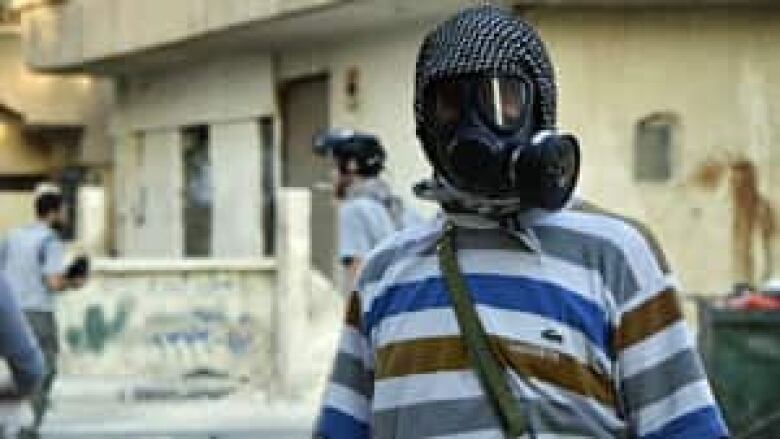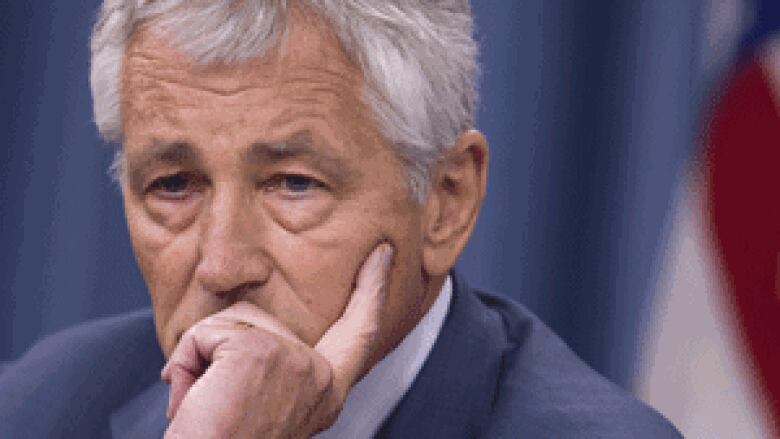Syria gas attack symptoms confirmed by doctors group
Doctors Without Borders says Syria 'chemical' attack killed 355 near Damascus
Syrian state media accused rebels of using chemical arms against government troops in clashes Saturday near Damascus, while an international aid group said it has tallied 355 deaths from a purported chemical weapons attack earlier this week.
Doctors Without Borders said three hospitals it supports in the eastern Damascus region reported receiving roughly 3,600 patients with "neurotoxic symptoms" over less than three hours on Wednesday morning, when the attack in the eastern Ghouta area took place.
Of those, 355 died, said the Paris-based group.
The Britain-based Syrian Observatory for Human Rights said Saturday that its estimated death toll from the alleged chemical attack had reached 322, including 54 children, 82 women and dozens of fighters. It said the dead included 16 who have not been identified.
The group said it raised its death toll from an earlier figure of 136, which had been calculated before its activists in the stricken areas met doctors, residents and saw medical reports. It said the dead "fell in the massacre committed by the Syrian regime."
'All the information we have is converging to indicate there was a chemical massacre in Syria, near Damascus, and that Bashar Assad's regime was behind it.' Laurent Fabius, French foreign minister
Death tolls have varied wildly over the alleged attack, with Syrian anti-government activists reporting between 322 and 1,300 killed.
George Sabra, leader of the Syrian National Council, told CBC News that "logically," the only faction capable of launching such an attack would be government forces.
"Everybody knows that was not the first time which the regime used the chemical weapons," he said from Montreal, adding that the U.S., British and French governments have collected evidence to support his claims.
Sabra urged the UN to send an investigation committee to "discover the truth" in Damascus with regard to neurotoxic casualtiessuffered byopposition fighters.

Sabra will be meeting members of the Syrian-Canadian community this week in Montreal, Ottawa and Toronto, and will also be speaking with Canada'sforeign affairs minister John Baird.
Prime Minister Stephen Harper has already spoken with his French and British counterparts about the Syria crisis. According to officials in Ottawa, French President Franois Hollande and British Prime Minister David Cameron shared concerns with Harper about accusations that the Syrian regime has used chemical weapons on civilians.
'100% sure' about chemical weapons
Stephen Cornish, executive director of Doctors Without Borders, told CBC News the organization'sdeath tallies from chemical weaponscome from reliable sources within Syria.

"In three of the locations where we've been helping, the doctors were receiving patients after the attack on Damascus on Wednesday, and that's where we've been able to confirm the number we've quoted," he said.
If the claims are true that the regime used chemical weapons on opposition fighters, Cornish said it would be a "moral outrage."
President of Doctors Without Borders Mego Terzian has said the evidence about a chemical attack is unequivocal.
"We are almost sure, even 100 per cent sure, that neurotoxic agents have been used, what type of agent we can not confirm, who did thatrebels or government troops we cannot confirm," he said.
Meanwhile, U.S. naval forces are moving closer to Syria as President Barack Obama considers a military response to the alleged chemical weapons use by President Bashar Assad's government.
U.S. defense officials told The Associated Press that the Navy had sent a fourth warship armed with ballistic missiles into the eastern Mediterranean Sea but without immediate orders for any missile launch into Syria. The officials spoke on condition of anonymity because they weren't authorized to discuss ship movements publicly.
Obama to decide on intervention
Obama emphasized that a quick intervention in the Syrian civil war was problematic, given the international considerations that should precede a military strike. The White House said the president would meet Saturday with his national security team to consider possible next steps by the United States. Officials say once the facts are clear, Obama will make a decision about how to proceed.
Syria's Information Minister Omran al-Zoubi dismissed the possibility of an American attack, warning that such a move would risk triggering more violence in the region.
"The basic repercussion would be a ball of fire that would burn not only Syria but the whole Middle East," al-Zoubi said in an interview with Lebanon-based Al-Mayadeen TV. "An attack on Syria would be no easy trip."
He blamed the rebels for the chemical attacks in Ghouta, saying that the Syrian government had proof of their responsibility but without elaborating. "The rockets were fired from their positions and fell on civilians. They are responsible," he said.
With the pressure increasing, Syria's state media accused rebels in the contested district of Jobar near Damascus of using chemical weapons against government troops Saturday.
Regime claims chemical allegations 'baseless'
'State TV broadcast images of plastic jugs, gas masks, vials of an unspecified medication, explosives and other items that it said were seized from rebel hideouts Saturday. It did not, however, show any video of soldiers reportedly affected by toxic gas in the fighting.
The claims could muddy the debate about who was responsible for Wednesday's alleged gas attack, which spurred demands for an independent investigation and renewed talk of potential international military action if chemical weapons were used.

Just hours before the state media reports, the UN disarmament chief arrived in Damascus to press Assad's regime to allow UN experts to investigate the alleged Wednesday attack. The regime has denied allegations it was responsible, calling them "absolutely baseless" and suggesting they are an attempt to discredit the government.
'The Syrian Army achieved major progress in the past days and for that reason, the terrorist groups used chemical weapons as their last card.' Syrian state television
The U.S., Britain, France and Russia have urged the Assad regime and the rebels fighting to overthrow him to co-operate with the United Nations and allow a team of experts already in Syria to look into the latest purported use of chemical agents. The UN secretary-general dispatched Angela Kane, the high representative for disarmament affairs, to push for a speedy investigation into Wednesday's purported attack. She did not speak to reporters upon her arrival in Damascus Saturday.
The state news agency said several government troops who took part in the Jobar offensive experienced severe trouble breathing or even "suffocation" after "armed terrorist groups used chemical weapons." It was not clear what was meant by "suffocation," and the report mentioned no fatalities among the troops.
"The Syrian Army achieved major progress in the past days and for that reason, the terrorist groups used chemical weapons as their last card," state TV said. The government refers to rebels fighting to topple Assad as "terrorists."
The report was followed by an unusual string of breaking alerts on the TV's news scroll Saturday, with a series of claims related to the alleged use of chemical arms by rebels in Jobar.
With files from CBC News, Reuters













_(720p).jpg)


 OFFICIAL HD MUSIC VIDEO.jpg)
.jpg)



























































































